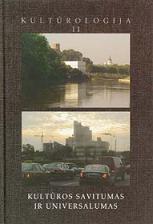METACIVILIZACIJOS KONTŪRAI IR KULTŪRINIS PLIURALIZMAS
CONTOURS OF THE METACIVILIZATION AND CULTURAL PLURALISM
Author(s): Author Not SpecifiedSubject(s): Social Sciences
Published by: Lietuvos kultūros tyrimų
Keywords: civilization; culture; cultural pluralism; comparative studies;
Summary/Abstract: The essay briefly discusses the shift of the economic power centres in the late 20th century and the background for the emergence of a new metacivilizational culture. Special consideration is given to the contradictory processes of globalization, the rise of new centres of economic power in the Far East and the global expansion of the region’s cultural and artistic values. Much attention is devoted to the discussion of the influence of the information revolution on metacivilizational culture. Its development is associated with globalization and complex processes of the creation of a new global community, new integral culture and pluralist system of values. These are not possible without fusing of the opposites, clash of different civilizational traditions, competition, and search for a better mutual understanding. The author distinguishes several extremely important processes of the turn of the millenium, which bear a historiosophical meaning and which will have a long-lasting influence on the history of civilization. Firstly, it is for the first time in the cultural history of humankind that there is a shift from rather isolated local civilizations to the common global metacivilization. The essence of the shift in the contemporary metacivilizational postmodernist culture is the transition from textual culture to visual culture, which is being implanted by the new virtual reality of the TV and computer screens. In the author‘s view, this global shift from text recession and degradation to the prominence of visual culture explains why, with the decline of classical Western principles of thinking and creation, the influence of non-classical principles of thinking and creation, which have developed in the hieroglyphic cultural zone (China, Japan), is so strong on the postmodernist culture. The essential changes of the postmodernist culture have a global, rather than local, historiosophical meaning. We are witnessing the collapse of the worldview and ideals of classical philosophy, aesthetics and art, which have formed in the Modern Age in Western European civilization. Thus considering the transformation of the forms of classical Western culture and art, we should clearly understand that the developments in the contemporary postmodernist culture and art do not represent the elitist style; rather it is a qualitatively new breakdown of the civilization.
Journal: Kultūrologija
- Issue Year: 2004
- Issue No: 11
- Page Range: 96-123
- Page Count: 28
- Language: Lithuanian

